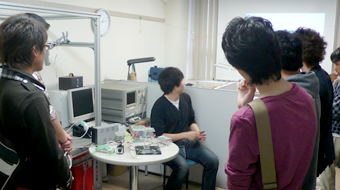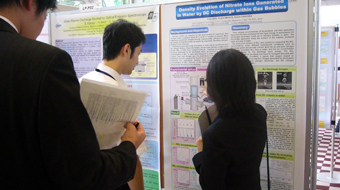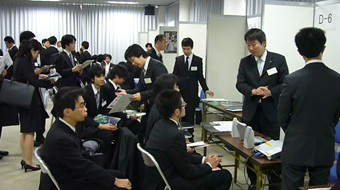Education
Electrical and Electronic Engineering
Graduate Major5 Features
Becoming a leader in Electrical and
Electronic Engineering
— a multi-industry discipline
-
1
Cutting-Edge Research in Technologies
That Form the Basis of the Modern World
Electrical and electronic technologies are used in all areas of modern society. We nurture students who have indispensable expertise in electrical and electronic engineering, and they go on to become globally successful engineers and research leaders. At our department, cutting-edge research is carried out with a focus on electric power, communications, electronic and optical devices, integrated circuits and systems, and material properties. With state-of-the-art research facilities and guidance from teaching staff successful in their respective branches, students can produce and publish research results that they can be proud of.
-
2
Joint Research with Other Disciplines,
Companies, and Overseas Researchers
Much collaborative research that transcends research laboratories and discipline boundaries are carried out at our department. Innovative and original research findings are produced on a daily basis by jointly tackling large-scale research projects. Because electrical and electronic engineering is connected to all industries, joint research with companies is thriving. Discoveries by students sometimes lead to the improvement of real products. Furthermore, increased collaborations with overseas organizations help make our research globally cutting-edge.
-
3
Master's Research Activities Develop Reasoning,
Judgment, and Negotiating Skills
During the course of the master's thesis research, students not only obtain advanced specialized knowledge and learn about cutting-edge technologies, but also acquire skills required in society, such as reasoning, judgment, and negotiating skills, through discussions with teaching staff and research laboratory members. At the midterm presentations and master's thesis oral defense, students can learn from the evaluations of their research content and presentation skills by all of the teaching staff at their research laboratory. They can also gain experience as a research assistant (RA) or teaching assistant (TA), cultivating their perspective of researchers and leaders.
-
4
A Doctoral Program That
Creates International Leaders
In the Doctoral Program, students build on what was learned in the Master's Program. They acquire highly advanced specialized knowledge and develop their skills to identify and solve problems. At the same time, economic and spiritual independence are encouraged. Learning and research are not confined within the boundaries of research laboratories. Students have the chance to participate in international conferences, overseas training, training at domestic companies, etc. Furthermore, students are assigned a mentor in addition to their academic supervisor as part of our multiple teaching staff support system. In this way, individuals with high expertise who go on to become successful global leaders are fostered.
-
5
Your Future Looks Bright

Electrical and electronic engineering is connected to all industries. Students at our department receive job offers from all sorts of companies, and there are over ten openings for every applicant. We have a strong career support system, which includes consultations, seminars, and recommendations. Many alumni have found employment in their desired field where they have become successful leaders. Around half of all alumni are employed at electronics manufacturers, but there are also many alumni who have found employment in industries such as automotive, railroad, broadcasting, electric power, and communications, as well as at companies outside the electrical and electronics sector.
